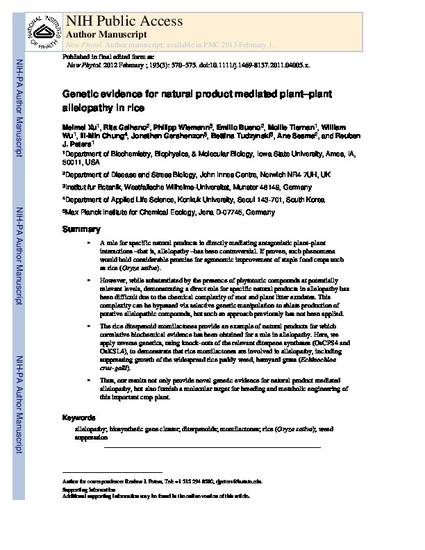
• A role for specific natural products in directly mediating antagonistic plant–plant interactions –that is, allelopathy –has been controversial. If proven, such phenomena would hold considerable promise for agronomic improvement of staple food crops such as rice (Oryza sativa)
• However, while substantiated by the presence of phytotoxic compounds at potentially relevant levels, demonstrating a direct role for specific natural products in allelopathy has been difficult due to the chemical complexity of root and plant litter exudates. This complexity can be bypassed via selective genetic manipulation to ablate production of putative allelopathic compounds, but such an approach previously has not been applied.
• The rice diterpenoid momilactones provide an example of natural products for which correlative biochemical evidence has been obtained for a role in allelopathy. Here, we apply reverse genetics, using knock-outs of the relevant diterpene synthases (OsCPS4 and OsKSL4), to demonstrate that rice momilactones are involved in allelopathy, including suppressing growth of the widespread rice paddy weed, barnyard grass (Echinochloa crus-galli).
• Thus, our results not only provide novel genetic evidence for natural product mediated allelopathy, but also furnish a molecular target for breeding and metabolic engineering of this important crop plant.
Available at: http://works.bepress.com/reuben_peters/43/

This is the peer reviewed version of the following article:Xu, M., Galhano, R., Wiemann, P., Bueno, E., Tiernan, M., Wu, W., Chung, I.-M., Gershenzon, J., Tudzynski, B., Sesma, A. and Peters, R. J. (2012), Genetic evidence for natural product-mediated plant–plant allelopathy in rice (Oryza sativa). New Phytologist, 193: 570–575, which has been published in final form at DOI: 10.1111/j.1469-8137.2011.04005.x. This article may be used for non-commercial purposes in accordance With Wiley Terms and Conditions for self-archiving.